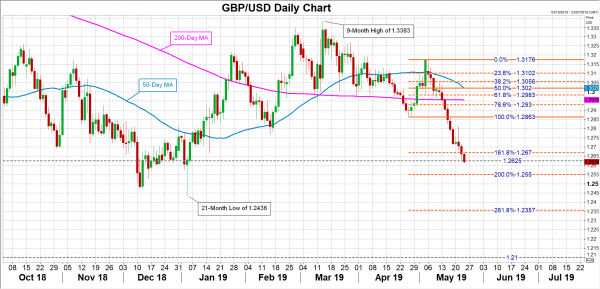Theresa May’s last-ditch attempt to secure support for her hard-fought Brexit deal failed dramatically on Tuesday with the beleaguered UK prime minister facing strong criticism from opposition parties as well as her own MPs. The pound has slumped on the overwhelmingly negative response to May’s tweaked Brexit offer to Parliament as a disorderly exit from the European Union once again started to look like a realistic prospect.
After promising a “new, bold offer” on the Brexit deal, May was struggling to convince lawmakers why they should vote in favour of the bill when it’s put to a vote for a fourth and final time in the first week of June. Although politicians have been quick to shoot it down, the revised package does contain plenty of significant concessions, which the prime minister has previously strongly resisted. May has set out plans to allow MPs to vote on whether to hold a second referendum, a vote on different customs arrangements with the EU, and provide safeguards on the Northern Irish backstop as well as guarantees on workers’ rights and environmental protection.
May’s new plan backfires
However, whilst striving to offer something for everyone, May has once again ended up pleasing no one and her amended deal looks dead on arrival. The spectacularly poor reception had a clear impact in currency markets. Speculation about what the new Brexit plan may include had briefly lifted the pound above the $1.28 level as traders got excited from market chatter of a second referendum. But the optimism didn’t last long, with sterling plummeting to 4½-month lows in the $1.26 handle after her proposals were dismissed by all sides of the political spectrum in Westminster.
The reaction has been so bad that there’s doubts about whether the government will go ahead with the vote or be forced to pull it. Either way, there appears to be little chance of the deal passing and the big question now is who will replace May when, not if, she steps down.
Boris Johnson favourite to replace May
Former foreign secretary, Boris Johnson, is the favourite at the moment to take over as leader of the Conservative party and as prime minister. Although Johnson has his fair share of critics, an expected disastrous showing for the party at the European elections on May 23 is seen as boosting his chances of winning a leadership contest as Conservative MPs are more likely to vote for a hardliner as their next leader if Nigel Farage’s Brexit party performs well at the polls.
But while such an outcome is what the Brexiteers have been dreaming about, it could spell trouble for sterling. Johnson’s first task as prime minister would probably be to try and renegotiate the Withdrawal Agreement. If the EU resists, which it most likely would, that would create a very strong risk of a no-deal Brexit as Johnson is known to favour such a scenario. Hence, the pound’s prospects over the summer months do not look particularly good.
Pound could soon be revisiting $1.21 level
At the moment, the pound appears to be seeking support in the $1.2625 area, which has been a congested region in the past. Breaking below this point would bring into range the 200% Fibonacci extension of the $1.2863-$1.3176 upleg at $1.2555 and the 2019 low of $1.2436. Looking further ahead, if a hardline Brexiteer is elected by the Tory party to replace May and the EU rejects the idea of reopening the Withdrawal Agreement, the $1.21 level – which hasn’t been visited since 2017 – would increasingly become an important target for the bears.
While it’s very possible the new Brexit deal will not be put to the test and May could resign within days rather than weeks, all the indications at the moment are that the government wants to press ahead with the vote in the week beginning June 3. May will probably do everything she can to get the House of Commons to approve the deal before the European Parliament’s current term ends on July 1. This is crucial because it wouldn’t require newly elected British MEPs to take up their seats in the new parliamentary session and the UK would be able to leave the EU by the end of July.
Corbyn a bigger nightmare for investors than a no-deal
But things are never quite so simple at Westminster. Assuming that, as expected, MPs again vote down the deal, the main focus for investors after that will be how quickly the Tory leadership race gets underway. Britain could have a new prime minister in the summer or the autumn.
Of course, one shouldn’t rule out the possibility that a new prime minister could be the outcome of a general election rather than a Conservative party leadership contest. What many investors fear more than a no-deal Brexit is having Labour leader, Jeremy Corbyn, running the country. Markets see Corbyn’s socialist policies as too left-wing and likely doing more damage to the UK economy than a crash exit out of the EU.

